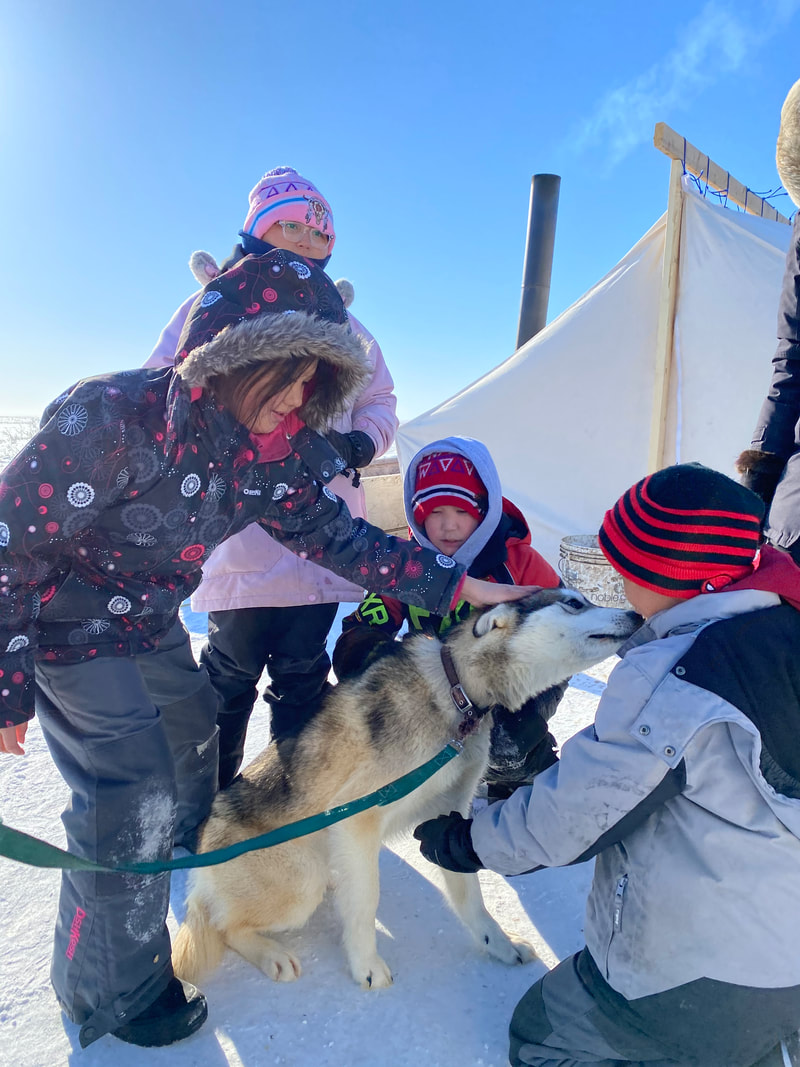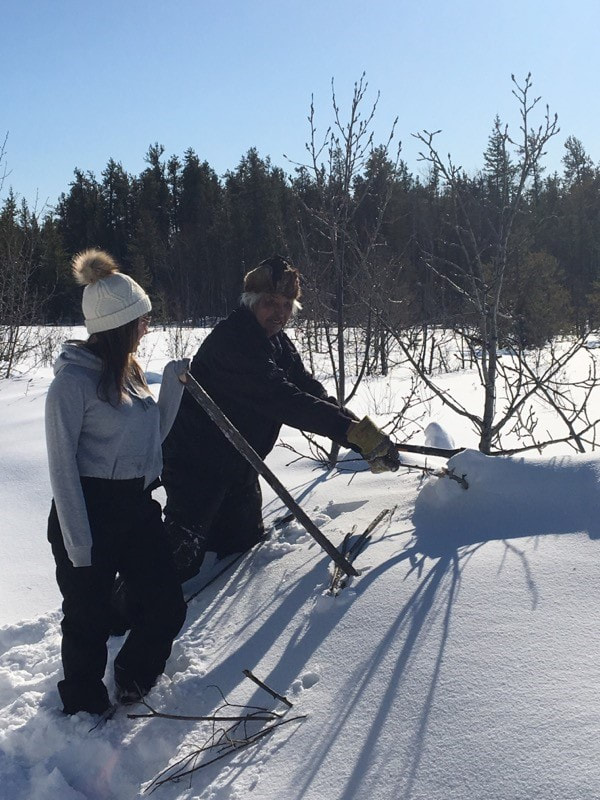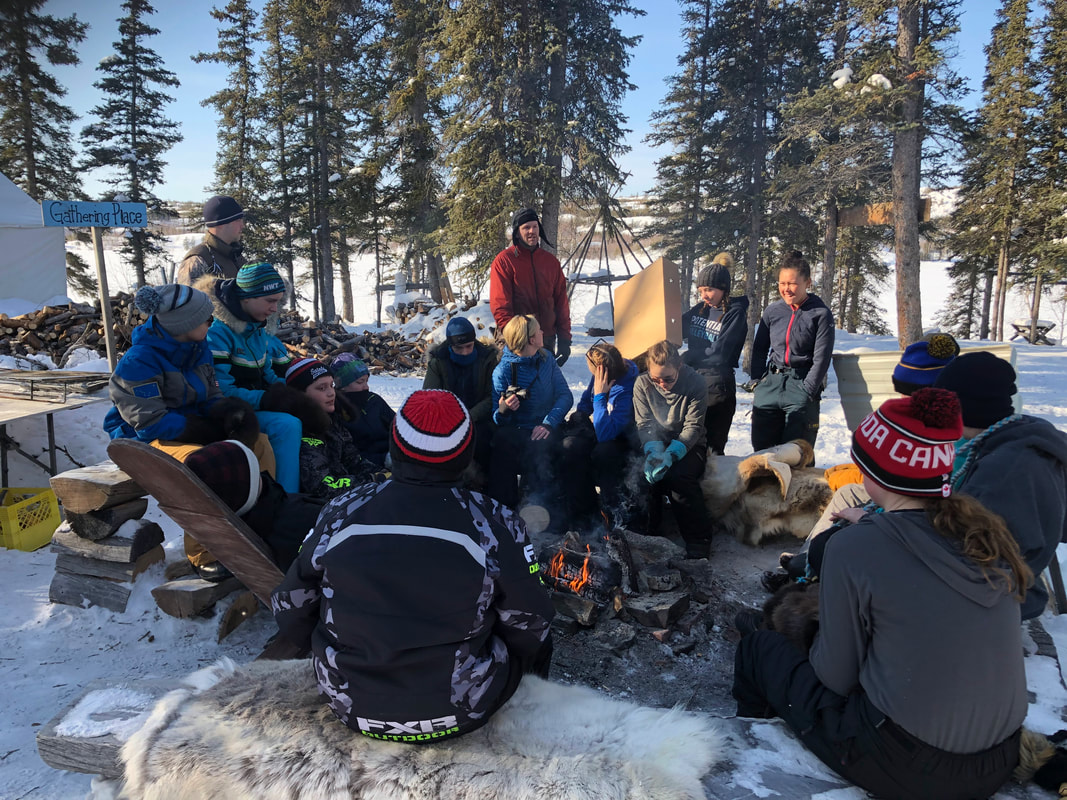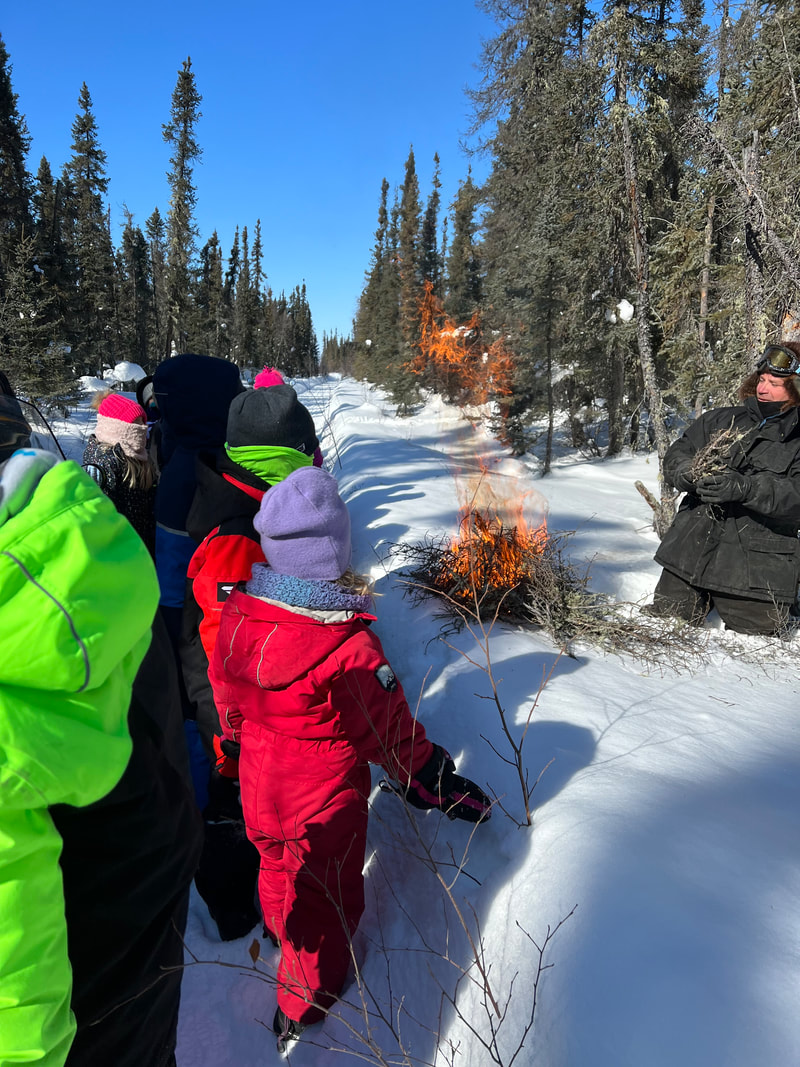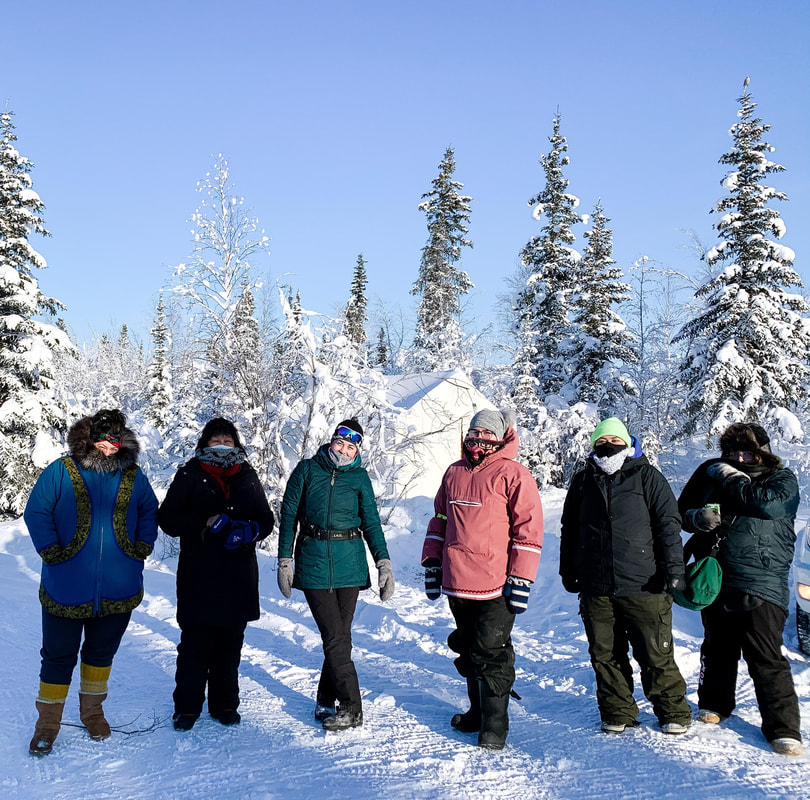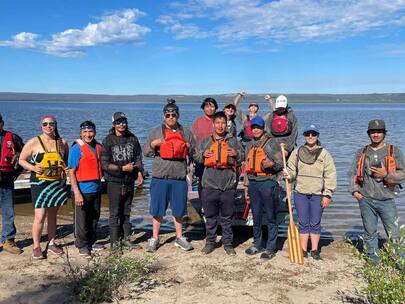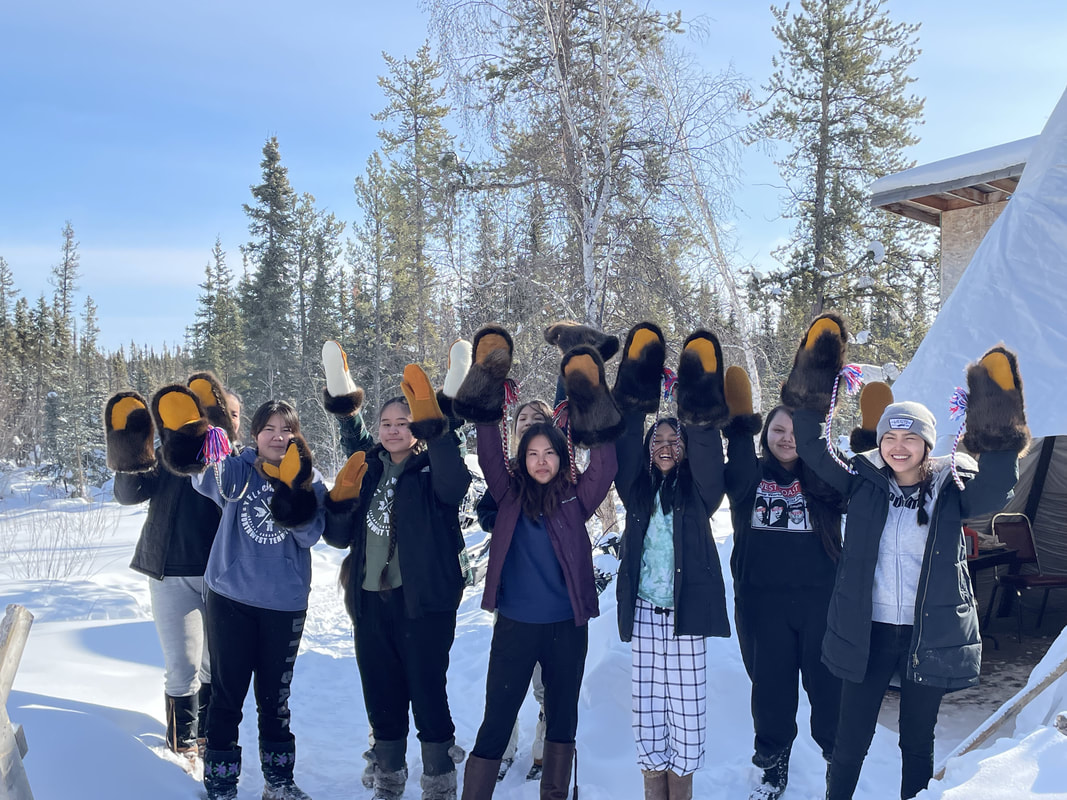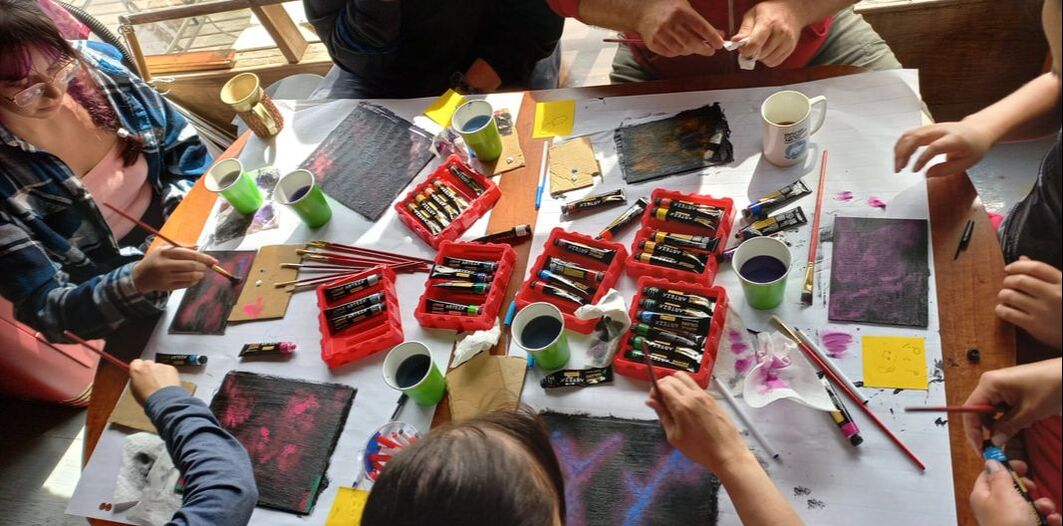Inuvialuit: Dog Sledding on the Pingos
Objective: To foster a connection between the students and their culture and community as they learn hands-on skills while on the land. We hope to achieve this through reinforcing traditional teachings and honoring traditional ways of learning. Description: In early spring, over 3 days Mangilaluk School was able to take approximately 95 students and 24 staff members to experience the traditional practice of dog mushing with Noksana Mushing led by local dog musher Bruce Noksana. Through trying some hands-on activities, the students were able to learn more about their culture and embrace the teachings offered at the on the land camp. The students enjoyed meeting the dogs and were keen to learn about safety before they embarked on their dog-mushing adventure. After returning, the students had an opportunity to listen to hunting and travelling stories from long ago as told by Elders.
Successes: The trip was a success as it built character and independence as the kids learned more about their culture in a fun, hands-on way. For the teachers involved, they were able to learn more about traditional life in Tuktoyaktuk which informed their
teaching practices. |
Dehcho: On the Land Camps
Objective: To engage the community by providing an opportunity where younger generations can learn about their traditions through Elder teachings. Description: Despite the challenges faced by Covid-19, West Point First Nation was able to set up a camp in early spring at kilometer 122 for the fifth year in a row. Their hope was to engage community members in traditional activities and help them reconnect with Elders and the land. Elder involvement was a key component of this camp, allowing for intergenerational transfer of knowledge to younger members. All the Elders who attended shared their teachings and information with the younger generations throughout the course of the camp and as a result, the youth were guided through a series of traditions that they could use for the rest of their lives. Some of the activities that took place included day hikes, story telling, setting nets under the ice, cutting fish, and rabbit snaring.
Successes: There is a growing sense of pride and confidence in the membership of the West Point First Nation that they attribute to time spent on the land. Through on the land camps like this, relationships with the land and between members are growing stronger.
|
Akaitcho: Traditional On the Land Pursuits
Objective: To provide Grade 8 students with time on the land where they can learn together about our local Indigenous culture and develop outdoor skills. Description: Students at École William MacDonald School had the opportunity to participate in their choice of one or both, Winter-camp/Camp Akaitcho and a Canoe trip to Hidden Lake. Students experienced many new things with both trips; they gained personal confidence as they learned about indigenous culture and traditions and outdoor skills, all while building relationships with their classmates and staff. For the winter camp at Quyta Lake 18 students and 5 chaperones learned how to operate snowmobiles, how to prepare and build a quinzee and igloo, how to set fish nets, and how to prepare the fish to eat. During the 5 day canoe trip, 16 students and 5 chaperones paddled to Hidden Lake where students received their Introduction to Tandem Lake Canoeing Paddle Canada course through Narwhal Adventures. For many students it was their first time in a canoe. Portaging, paddling skills, camping skills, cooking and preparing meals, were just a few of the land based skills learned by the students. Both trips fostered personal growth in the students through teamwork and independent learning.
|
Successes: The trips were a considerable success as they positively impacted the student’slives and taught them many new transferable skills. Students were able to realize their own potential, and both trips were seen to have a positive impact on their mental health. These lessons and memories will be with them for the rest of their lives.
|
South Slave: Youth & Elder Rabbit Snaring
Objective: To engage community members in an annual rabbit snaring event. The event includes kids participating in the snaring of rabbits to make rabbit stew for Elders in the community to enjoy. Description: Setsi’e Frederick Daycare has been able to offer this rabbit snaring event for the last 3 years. Over the years the program has grown to become so much more than just snaring with Elders, but a beloved annual community project. This year they were able to incorporate 24 children aged three to 11 guided by an Elder through the process of making and setting snares to catch rabbits. The kids were first taught how to create and set the snares, then spot and identify animal tracks. There was an emphasis on acknowledging the value of the land and how to value the number of rabbits they caught. After catching the rabbits, the children were shown how to skin the rabbit and use the meat to make rabbit stew. The stew was then delivered to Woodland Manor for the Elders there to enjoy. Due to Covid-19 they were unable to deliver the stew in person, but the children were happy to be able to provide a nice meal for their Elders.
Successes: Multiple external factors played a role in creating a successful event, such as fresh snow for tracking and catching three rabbits. Passionate Elders taught the kids, and community members went above and beyond to give the kids a memorable experience.
|
Gwich'in: AYDA Cohort On the Land Programming
|
Successes: Being able to host the camp again after Covid-19 cancelling previous years was a success for all those involved. Since the language camp has taken place a few participants have stayed in contact with each other to have online Zoom language lessons to support one another on their language journeys
|
Objective: To hold on the land camps throughout the winter and summer to provide youth ages 14-25 in Inuvik with an opportunity to learn leadership development and traditional skills in a positive and safe learning environment. Description: The Arctic Youth Development Agency is an Indigenous youth-led non-profit based out of Inuvik that was designed to invest in the leadership and holistic development of youth in the Arctic. Their
programming seeks to connect youth with their community, culture, and the land. In February, 20 young women ages 15-29 years old from the communities of Inuvik, Aklavik and Paulatuk, were able to participate in a language camp that was led by all-female facilitators and Elders. The camp allowed for rich conversations to be had as the young women spoke about their own personal experiences, their hopes for their language futures, and their thoughts on what it takes for them to thrive in a healthy community. The group naturally came together and created a strong sense of community with one another despite only being together for a few days. The youth felt that being able to gather as women to have these conversations was a truly powerful experience, and that they wished it could have been longer! |
Sahtú: Canoeing in Tuyeta
|
Successes: The trip was a great success in the eyes of the youth, Elders, and everyone that participated. It was remarkable to have the Elders join and share stories about the lake and their past adventures there.
|
Objectives: To provide youth with a canoe trip to strengthen their well-being and mental health. In addition, the youth can find balance and peace in their life to help them plan the next steps in their life. Description: Intergenerational knowledge transmission about Ts’udé Nilįné Tuyeta is crucially important as the Elders who grew up there continue to pass. By bringing youth on the land to learn about their culture and traditions, a greater pride and understanding can lead to healthy futures for the youth both culturally and economically. For this canoe trip, six youth were accompanied by four guardians, Elders, and a paddling instructor on a 140 km route from Loche Lake to Hare Skin River. During the trip the youth
gained Paddle Canada canoe certifications, took part in cultural activities, and visited historical family cabins and burial sites. The youth felt great accomplishment and satisfaction after completing the trip because they worked so hard leading up to and during it. |
Tłı̨chǫ: Cultural Programs
Objective: To teach and engage a group of girls ages 14 to 20 in many traditional activities over a ten-day camp in an effort to help strengthen Tlicho culture. The youth will learn how to process a caribou from start to finish. Description: Over the course of ten days the group of young Tlicho women were able to experience first hand how to do many traditional activities while under the guidance of Elders. Some of the activities included working with a caribou. This included butchering the caribou, preparing dry meat, and working with the caribou hide. The girls understood first hand the difficulty in processing a caribou and how caribou have been integral to the survival of the Tlicho. Other activities included setting fish-nets, setting snares, and making beaver mittens. After ten days the
girls felt empowered, more confident in their on the. |
Successes: The camp was a great success as girls realized all the hard work the women before them had done to support families and the community and how to keep their culture for generations to come. Everyone involved hopes to have more camps in the
future due to the success. |
Northwest Territories: On the Land Cultural Teachings with FOXY Elders
Successes: The event was a great success, and everyone participating learned a lot; an excellent foundation was also established for future events. With this strong foundation, FOXY can co-create programs and retreats in the future, helping many northerners.
|
Description: FOXY brought together 14 youth and adult staff members for a three day on-theland team-building event to learn from Chipewyan and Métis Elders about the land, medicines, and
Indigenous wellness. The camp taught participants about traditional food preparation, The Medicine Wheel, Indigenous Games, the seven traditional ways of healing, and more about wellness and self care from the perspective of Indigenous people. The programming and teachings from Elders were rooted in trauma informed practices with the highest regard for participant safety. After the program FOXY participants incorporated the teachings they learned into lesson plans for 3 Peer Leader Retreats held in July and August 2021. |
